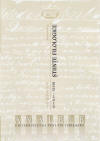Conjunctivul în enunţurile performative
The Role of the Subjunctive in Performative Sentences
Author(s): Mirela-Ioana BorchinSubject(s): Language and Literature Studies
Published by: Editura Universităţii de Vest din Timişoara
Keywords: Romanian grammar; verbal moods; performative sentences; pragmatics
Summary/Abstract: From a linguistic point of view, there are two types of conjunctive in Romanian: the so-called conjunctive1, equivalent of the imperative mood, occuring exclusively in main clauses, and the so-called conjunctive2, equivalent of non-finite moods, ocurring in subordinate clauses. This distinction is emphasized by the pragmatic effects of their most frequent uses. In our pragmalinguistic approach, we deal with the illocutionary force of performative utterings including both types of conjunctive. The speaker uses these types of conjunctive in direct speech to express orders, interdictions, recommendations, invitations, wishes, advice, warnings, threatenings, apologizes etc. His intention is to change the state of things for better. The only actor of change is the listener, who may accept or refuse to adequate his action to the intention of the speaker. His positive or negative reaction determines the success or the failure of the utterances. In such contexts, the conjunctive functions as a modus, being able to indicate the cardinal values of deontic modalities, in free variation not only with the imperative mood, but also with modal auxiliaries and with adverbial modifiers which express compulsory or non-compulsory, permitted or non-permitted actions.
Journal: Analele Universităţii de Vest din Timişoara.Seria ştiinţe filologice
- Issue Year: 2010
- Issue No: 48
- Page Range: 96-117
- Page Count: 22
- Language: Romanian

